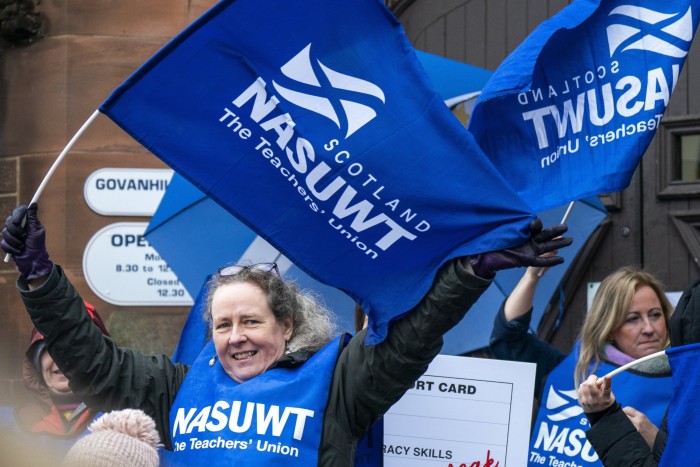Receive free UK labour disputes updates
We’ll send you a myFT Daily Digest email rounding up the latest UK labour disputes news every morning.
Junior doctors in England begin the longest single walkout by doctors in the NHS’s history on Thursday, a five-day strike that hospital bosses warned will further hamper efforts to tackle treatment backlogs.
The strike escalates the stand-off with Rishi Sunak’s Conservative government, which is battling to contain inflation and has offered doctors a 5 per cent rise this year. The British Medical Association, the doctors’ union, has rejected this.
The industrial action is due to be followed by a two-day walkout by consultants next week and then two days of strikes by radiographers. Teaching unions are also preparing for a fresh wave of action when schools return this autumn.
Negotiations between the BMA and the government remain deadlocked, with chancellor Jeremy Hunt refusing to borrow more money to fund a 6 per cent public sector pay rise recommended by independent pay review bodies for 2023-24.
The BMA, which has demanded a 35 per cent pay rise, urged health secretary Stephen Barclay to follow the lead of the Scottish government, which last week averted strikes by agreeing a 17.5 per cent pay deal over two years with the Scottish BMA.
Barclay said it was “disappointing” that the strike was going ahead, adding the 35 per cent pay demand was “unreasonable” and inflationary.
“If the BMA shows willingness to move significantly from their current pay demands and cancels these damaging and disruptive strikes, we can get around the table to find a fair deal to resolve this dispute,” he added
Vivek Trivedi and Robert Laurenson, co-chairs of the BMA junior doctors committee, accused the government of “complete inflexibility” for its refusal to talk to doctors until they reduced their pay demand. The BMA says the demands represent 15 years of pay erosion.
“We can call this strike off today if the UK government will simply follow the example of the government in Scotland and drop their nonsensical precondition of not talking,” they added.
Eight months of industrial action has already led to the rescheduling of more than 650,000 routine procedures and appointments, with tens of thousands more likely to be delayed, according to NHS Providers, which represents NHS hospital trusts.
Sir Julian Hartley, the body’s chief executive, said there was “frustration and deep concern” among Trust leaders at the lack of an apparent resolution to the strikes. They were making it “increasingly hard” to improve productivity, he added, estimating that industrial action in April alone cost the NHS £100mn in overtime pay for consultants and lost earnings.
Hartley warned that the looming industrial action would lead to an unprecedented level of disruption to patient care and risked denting staff morale further.
An NHS Providers survey found that only 43 per cent of NHS Trust leaders expect to meet an interim recovery target that 76 per cent of patients attending accident & emergency should be seen within four hours.
“I think it is fair to say this is probably the most challenging period of operational pressure the NHS has faced, and I think the impact of strike action has just made all of this so much more difficult,” Hartley added.

The NASUWT, the Teachers’ Union, announced on Wednesday that its members had voted to strike but that for now it was calling for “industrial action short of strike action”, with 94 per cent voting in favour of the move, on an overall turnout of 52 per cent.
The union said it was drawing up a programme of action starting in September, with teachers expected to work to rule — refusing to cover extra curricular activities and perform routine administrative tasks.
Other unions, including the National Education Union (NEU) and unions for headteachers and college leaders, the NAHT and the ASCL, are all conducting fresh ballots for industrial action, which close later this month.
Kevin Courtney, the joint general secretary of the NEU, said the government should accept the recommendation of the School Teacher Review Body, which it believes is 6.5 per cent — a raise the union says could settle the dispute.
“The government still has time to avert industrial action in the autumn term by publishing the School Teacher Review Body pay recommendations and engaging in talks with education unions,” he added.
Stay connected with us on social media platform for instant update click here to join our Twitter, & Facebook
We are now on Telegram. Click here to join our channel (@TechiUpdate) and stay updated with the latest Technology headlines.
For all the latest Business News Click Here
For the latest news and updates, follow us on Google News.
